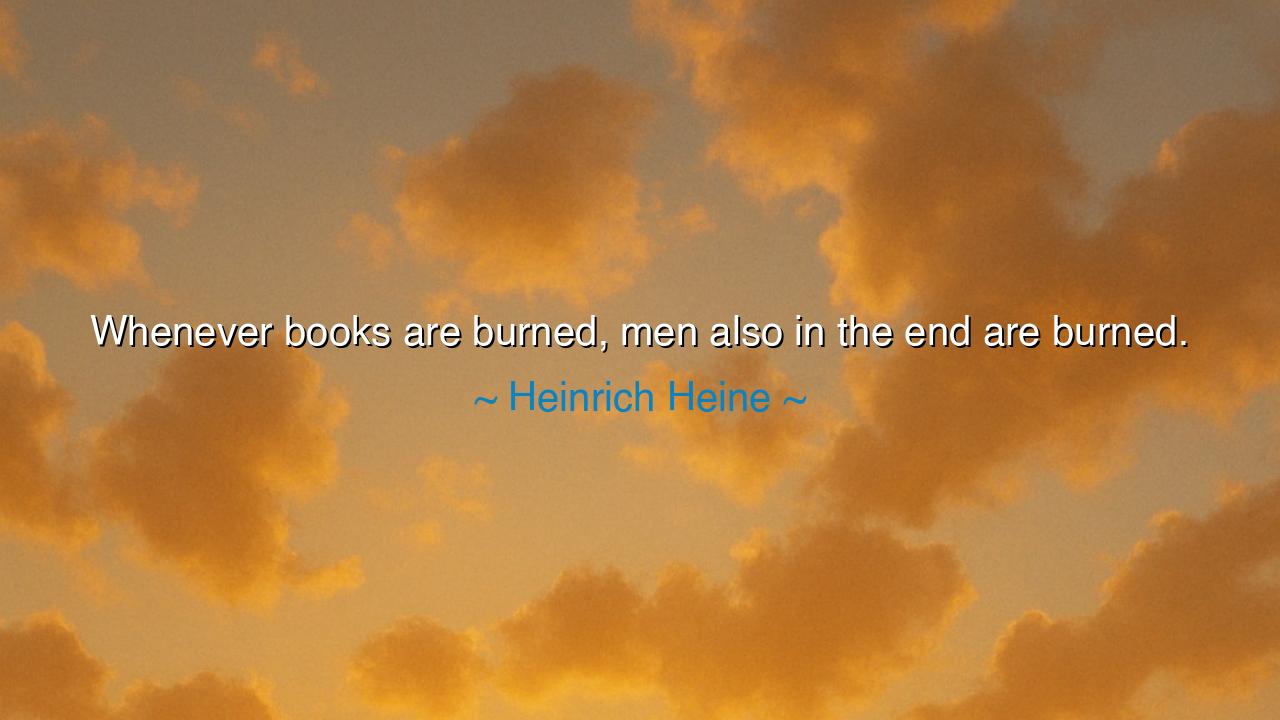
Whenever books are burned, men also in the end are burned.






Hear the solemn warning of Heinrich Heine, poet and prophet, who spoke with fire in his voice: “Whenever books are burned, men also in the end are burned.” This is not a mere metaphor, but a vision of the dark chain that links the destruction of ideas with the destruction of lives. For when the written word is silenced, when thought itself is smothered, it is but a prelude to violence against flesh and blood. Heine, writing in the nineteenth century, foresaw with tragic clarity the path that nations would later walk, where flames first devoured the wisdom of the ancients and then consumed the bodies of men and women in war and genocide.
The book is no simple object of ink and paper—it is the vessel of memory, the guardian of freedom, the ark of civilization. To burn it is to declare war upon thought itself, to erase the record of human striving, to break the mirror in which we see both our greatness and our folly. The tyrant always fears the book, for the book whispers truths that cannot be chained. And so, the fire begins—not with men, but with the fragile pages that dare to question, to inspire, to rebel.
History bears grim witness to Heine’s prophecy. In 1933, in the plazas of Germany, the Nazis cast thousands of volumes into roaring flames. Works of science, poetry, and philosophy—written by Jews, liberals, pacifists, and free thinkers—were condemned as “un-German.” The crowds cheered as the words turned to ash. Yet within a decade, it was not only books but also men, women, and children who were consumed by the fire of hatred. The burning of pages became the burning of people, proving that Heine’s words were not poetry but fate.
Nor is this tragedy confined to one land or time. In ancient China, the emperor Qin Shi Huang ordered the burning of the classics, fearing that the wisdom of the past would challenge his authority. Scholars were buried alive, their voices silenced with the ashes of their books. The empire sought to erase memory itself, but in doing so, it declared war upon its own soul. Where knowledge dies, humanity suffers; where truth is forbidden, cruelty reigns unchecked.
The meaning of Heine’s words is therefore both terrible and noble. Terrible, because they reveal the depths of destruction that follow when thought is silenced. Noble, because they call upon every generation to guard the flame of knowledge as one guards life itself. To protect a book is to protect a man, a woman, a child. To preserve the word is to preserve the world. Ideas are the breath of freedom; without them, mankind suffocates in tyranny.
The lesson is clear: do not dismiss the burning of a book as a small matter. Each act of censorship, each silencing of truth, each attempt to erase memory is a seed of violence against human dignity. If we allow the word to be destroyed, the body will soon follow. If we guard the word, we guard life itself.
Practical actions follow. Read deeply, for the preservation of wisdom begins in the heart of the reader. Defend libraries and schools, for they are the citadels of civilization. When you see knowledge under attack, speak boldly, for silence is the ally of flames. Teach children not only to love stories, but to see in them the armor of freedom. And when you encounter voices that are strange, foreign, or unsettling, do not cast them into the fire—listen, wrestle, and learn. For in protecting even the words we do not fully understand, we protect our own humanity.
Thus let Heine’s warning echo through the ages: “Whenever books are burned, men also in the end are burned.” Let no flame devour the pages of wisdom without resistance. Let no tyrant silence truth without challenge. For the book is life, and to defend it is to defend mankind itself.






AAdministratorAdministrator
Welcome, honored guests. Please leave a comment, we will respond soon